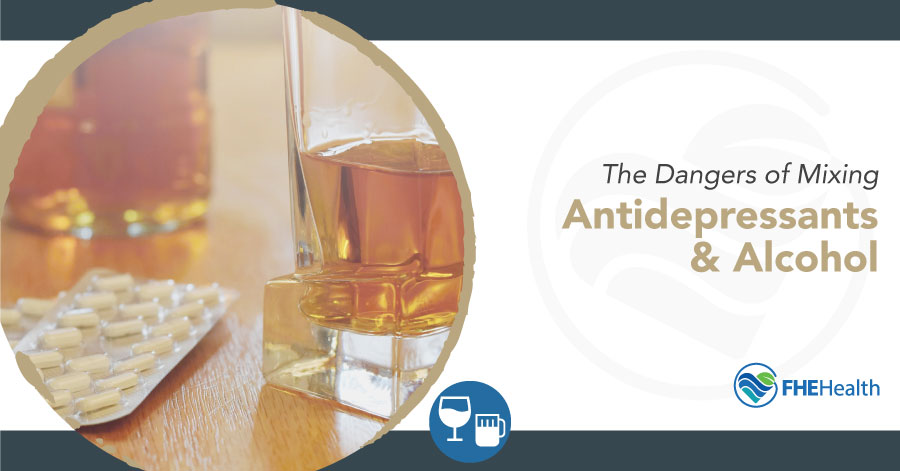
Updated 10/16/2024
Most people are unfamiliar with the side effects of drinking while taking antidepressants. Many misguidedly believe that the depressant effects of alcohol simply counteract the antidepressant effects of SSRIs, SNRIs, and MAOIs. Nothing could be further from the truth. Understanding why the combination of antidepressants and alcohol is harmful to your physical and mental health begins with understanding the mechanism of action for both these substances.
Alcohol Is a Powerful Nervous System Depressant
Two beers or one mixed drink is enough to alter brain levels of serotonin, dopamine, and other neurotransmitters involved in mood, motivation, and inhibition. A lesser neurotransmitter called glutamate is responsible for increasing brain activity levels. Alcohol interferes with glutamate release, causing a drastic slowdown of all brain regions.
Alcohol also increases the inhibitory effects of GABA, a neurotransmitter implicated in decreasing energy and calming the nervous system. Similar to anti-anxiety prescription drugs like Valium and Xanax, which increase GABA levels to produce sedation, alcohol works to cause slurring speech, loss of coordination, drowsiness, and other signs of intoxication.
Understanding the Mechanism of Action of Antidepressants
The most common type of antidepressants prescribed are called selective serotonin reuptake inhibitors (SSRIs). Lexapro, Prozac, Paxil, and Zoloft are the most well-known SSRIs and are taken by millions of people in the U.S. for depression, anxiety, obsessive-compulsive disorder, PTSD, and panic disorder.
SSRIs increase serotonin levels in the brain by blocking the reuptake (reabsorption) of serotonin by brain cell receptors. Serotonin is a neurotransmitter that controls mood, motivation sleep, appetite, and libido. People with depression and anxiety have lower than normal levels of serotonin in their brain. SSRIs effectively raise serotonin to improve mood and relieve depression.
Some SSRIs also increase norepinephrine, a neurotransmitter that plays an important role in mood and cognition. People are prescribed serotonin norepinephrine reuptake inhibitors (SNRIs) when SSRIs do not provide enough relief from depression and anxiety.
Drinking and Antidepressants: What Happens When You Mix Zoloft and Alcohol?
When you drink alcohol and take Zoloft or another SSRI, you will likely feel more depressed, anxious, and impaired than if you were drinking alcohol by itself.
In addition, alcohol directly counteracts what SSRIs are formulated to do–moderate brain chemistry to make you feel better. Although mixing alcohol with antidepressants may significantly improve your mood at the time, alcohol inhibits the ability of SSRIs to produce long-term, therapeutic benefits.
Signs of alcohol intoxication, such as impaired thinking and judgment, delayed reaction time, loss of coordination and motor skills, and sedation, can significantly intensify when you mix antidepressants and alcohol. Doctors call this condition “pathological intoxication,” a type of markedly severe intoxication that involves a person behaving in an uncharacteristically violent or aggressive manner. Combining antidepressants like Prozac and alcohol have been known to cause people to become pathologically intoxicated, even though they may have had only one or two drinks.






